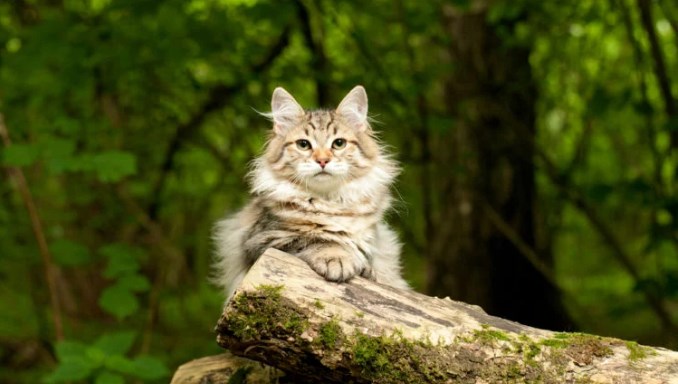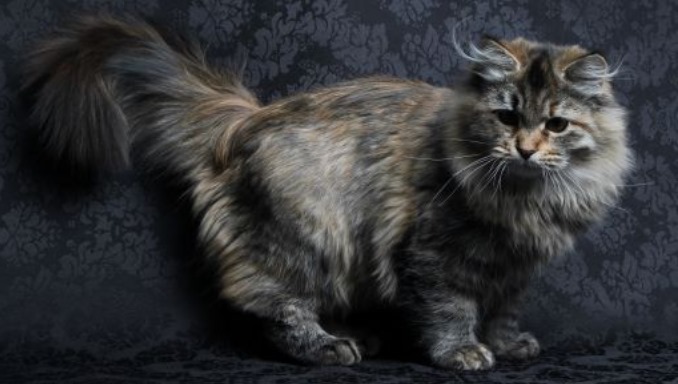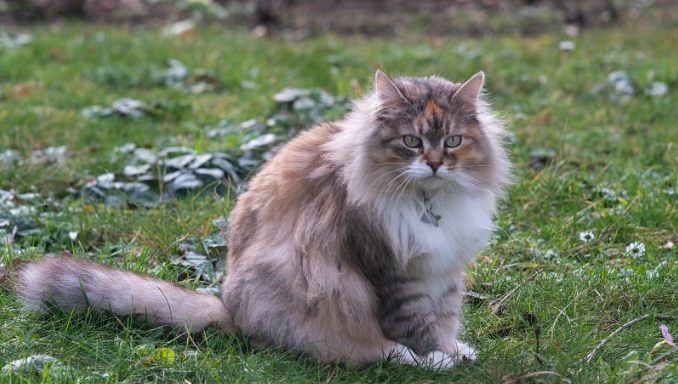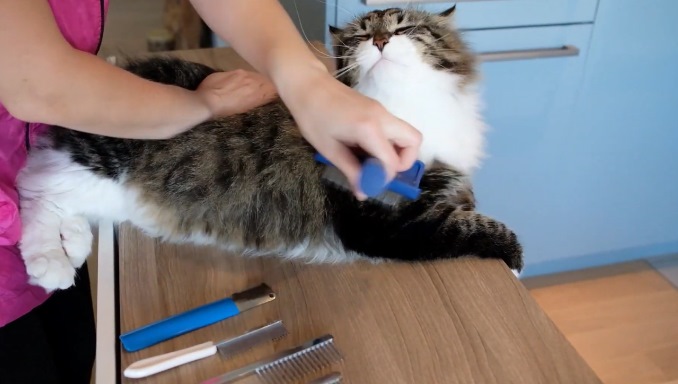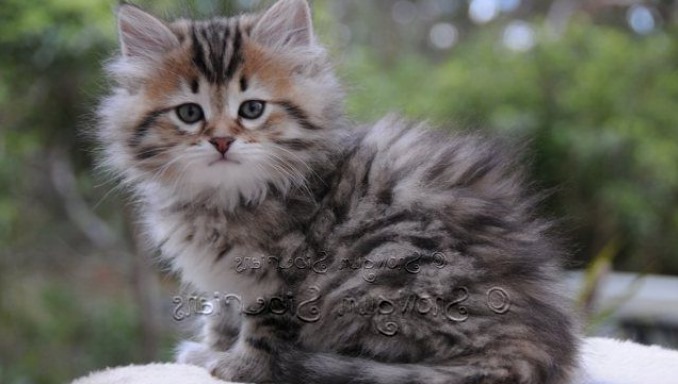Are siberian cats hypoallergenic? There is a lot of talk about whether siberian cats are hypoallergenic or not. As it turns out, the answer to this question is not as straightforward as one might think. In this blog post, we will take a look at what makes siberian cats hypoallergenic and what potential allergens you should keep in mind if you are considering adopting one of these furry friends.
What Is A Hypoallergenic Cat?
The term hypoallergenic is often used to describe products or materials that are less likely to cause an allergic reaction. In the context of cats, a hypoallergenic cat is one that produces fewer allergens than other cats. Allergens are proteins that can cause an immune response in people who are allergic to them.
There are two main types of allergens that can be present in cat fur: dander and saliva. Dander is made up of dead skin cells that contain proteins that can cause an allergic reaction. Saliva also contains proteins that can trigger an allergy, but it is also the main source of Fel d 1, the most common allergen found in cats.
Fel d 1 is a protein that is produced in a cat’s saliva and skin. It is transferred to their fur when they groom themselves. When a person who is allergic to Fel d 1 comes into contact with it, they may experience symptoms such as sneezing, coughing, watery eyes, and difficulty breathing.
Cats are one of the most popular pets in the world, but they can also be one of the most dangerous for people with allergies. Cat allergies are caused by a protein called Fel d 1, which is found in cat saliva and skin. When a person with a cat allergy comes into contact with this protein, they may experience symptoms such as sneezing, watery eyes, and itchiness. In severe cases, they may also have trouble breathing.
Most people with cat allergies are not in danger of having a severe reaction, but there is a small minority who are at risk for anaphylaxis, which is a life-threatening allergic reaction. If you or someone you know has a cat allergy, it is important to be aware of the signs and symptoms of anaphylaxis and to have an emergency plan in place in case of a reaction.
Are Siberian Cats Hypoallergenic?
Siberian cats are often touted as being hypoallergenic because they produce less Fel d 1 than other cats. However, it is important to note that there is no such thing as a completely hypoallergenic cat. All cats produce allergens, and even Siberian cats can cause an allergic reaction in people who are sensitive to them.
That being said, Siberian cats do produce less Fel d 1 than other cats, and they are considered to be one of the breeds that is more likely to be tolerated by people with cat allergies. If you are considering adopting a Siberian cat, it is important to meet with the cat beforehand to see if you have a reaction to them.
In conclusion, Siberian cats are not completely hypoallergenic, but they are less likely to cause an allergic reaction than other cats. If you have a cat allergy, it is important to meet with the cat beforehand to see if you have a reaction to them.
Comments from experts and cat parents say that Siberian cats are one of the most hypoallergenic breeds around. They produce fewer allergens than other cats, making them a good choice for people with allergies.
Siberian cats are known for being very affectionate and loving towards their owners. They are also known for being intelligent and easily trained. Some people believe that Siberian cats make great therapy cats because of their calm and loving nature.
While there is no guarantee that any cat is 100% hypoallergenic, Siberian cats are a good choice for people with allergies who still want to enjoy the companionship of a furry friend.
How to Minimize the Risk of Allergies from Siberian Cats
If you are allergic to cats but still want to adopt a Siberian, there are a few things you can do to minimize the risk of an allergic reaction.
– Choose a hypoallergenic food for your cat. There are many brands of cat food that are specifically designed for cats who produce fewer allergens.
– Have your cat groomed regularly. Grooming helps to remove allergens from the fur and can help to reduce the amount of Fel d 1 that is shed.
– Keep your cat out of your bedroom. This will help to minimize your exposure to allergens and will also give you a place to retreat to if you have a reaction.
– Vacuum regularly and dust often. This will help to remove allergens from your home and will make it easier to keep them under control.
– Consider using an air purifier. Air purifiers can help to remove allergens from the air and can make your home more comfortable for you if you have allergies.
Siberian cats are a good choice for people with allergies who still want to enjoy the companionship of a furry friend. By taking some precautions, you can minimize the risk of an allergic reaction and make your home more comfortable for both you and your cat.
There are a few things you can do to reduce the risk of your Siberian cat causing allergies. One is to keep them well-groomed and clean. Regular baths will help remove any allergens that may be present in their fur. Another is to feed them a hypoallergenic diet that does not contain any potential allergens. Finally, you can have your cat regularly checked by a veterinarian to ensure that they are healthy and not shedding any excessive amounts of fur. If you do all of these things, you should be able to greatly reduce the risk of your Siberian cat causing allergies.
Siberian Cats: About the Breed
Siberian cats are a relatively new breed that originated in Russia. These cats are known for their thick, luxurious coats, which can come in a variety of colors and patterns. While they are typically gentle and good-natured, Siberian cats can also be very active and playful. If you’re considering adding one of these beautiful cats to your family, here’s what you need to know about Siberian cats.
Siberian cats are a medium-sized breed, with males typically weighing between 15 and 20 pounds and females averaging 10 to 15 pounds. They have long, thick fur that is especially dense in the winter months. Siberians come in a wide range of colors and patterns, including black, blue, brown, cream, gold, green, orange, silver, white, and even tortoiseshell.
One of the most notable things about Siberian cats is their personality. They are typically very gentle and good-natured, making them great companions for families with children. They are also known to be intelligent and playful, often keeping themselves entertained with toys and games. Siberian cats typically get along well with other pets, including dogs.
If you’re thinking of adding a Siberian cat to your family, it’s important to do your research to make sure they are the right fit for you. While they are generally healthy and low-maintenance cats, they do require regular grooming to keep their thick coats looking their best. Siberian cats typically live between 12 and 16 years, though some have been known to live 20 years or more.
Siberian cats are medium to large sized cats with thick fur that comes in a variety of colors. They are a relatively new breed, having only been around since the 1980s. However, they have quickly become one of the most popular cat breeds in the world. Siberian cats are known for being very affectionate and loving towards their owners. They are also known for being intelligent and easily trained. Some people believe that Siberian cats make great therapy cats because of their calm and loving nature. The variety can be seen in Russian paintings and writings dating back hundreds of years. This sets them apart from breeds that are the result of fairly recent selective breeding.
Things to Know before Raising Siberian Cats
If you’re thinking of adding a Siberian cat to your home, there are a few things you should know first. Siberians are one of the most popular cat breeds, known for their beautiful coat and friendly personality. But like all cats, they have some specific needs that must be met in order to keep them healthy and happy. Here’s what you need to know before bringing a Siberian cat into your home.
Siberian cats need lots of space to run and play. If you live in a small apartment, they may not be the right breed for you. They also need access to the outdoors, so a home with a backyard is ideal.
These cats are very social creatures and love to be around people. They’re known for being very affectionate, and will often follow their owners around the house. If you’re looking for a independent cat that doesn’t need much attention, a Siberian is not the right breed for you.
Siberian cats are high energy and require a lot of exercise. Daily play sessions and a scratching post are a must to keep them happy.
This breed is known for being very vocal, and they will often “talk” to their owners using a distinct meow. If you’re looking for a quiet cat, a Siberian is not the right breed for you.
Siberian cats are relatively easy to care for, but they do require regular grooming. Their long, thick fur needs to be brushed daily to prevent matting, and they should be bathed once a month.
If you’re thinking of adding a Siberian cat to your family, be sure to do your research first. These beautiful creatures make wonderful pets, but they’re not right for everyone. With a little knowledge and preparation, you can be sure to find the perfect cat for your home.
How to Care for Siberian Cats
Siberian cats are one of the most popular breeds of house cats, and it’s no wonder why. They’re absolutely gorgeous, with their thick fur coats and striking blue eyes. They’re also very affectionate and loving, and make great companions. If you’re thinking about getting a Siberian cat, or if you already have one, here are some tips on how to care for them.
First and foremost, you need to make sure that your Siberian cat has plenty of fresh, clean water to drink. They tend to drink a lot, so it’s important to keep their water bowl full at all times. It’s also a good idea to have more than one water bowl in your home, just in case one gets knocked over or dirty.
Secondly, you need to groom your Siberian cat regularly. Their thick fur coats can get matted and tangled easily, so it’s important to brush them every day. If you don’t have time to do this yourself, there are plenty of professional grooming services that can do it for you.
Third, you need to provide your Siberian cat with plenty of exercise. They love to play, so make sure you have plenty of toys for them to play with. You can also take them for walks on a leash, or set up a scratching post or cat tree for them to climb.
Fourth, you need to make sure that your Siberian cat has a good diet. They need a high-quality diet that’s rich in protein and fat, so they can stay healthy and maintain their thick fur coats. There are plenty of great commercial cat foods on the market that are specifically formulated for Siberians, or you can talk to your veterinarian about the best diet for your cat.
Finally, you need to provide your Siberian cat with plenty of love and affection. They’re very loving creatures, and they thrive on attention from their owners. Make sure you spend plenty of time playing with them, petting them, and just generally showing them how much you care.
By following these tips, you can be sure that your Siberian cat will be healthy, happy, and well-cared for. They make wonderful companions, and with proper care, they can live long, healthy lives.
How to Groom A Siberian Cat
The Siberian cat is a beautiful, long-haired breed that originates from Russia. They are known for being loving, gentle and affectionate cats that make great companions. Although they do require some additional grooming to keep their coat looking its best, the effort is well worth it! Here are some tips on how to groom your Siberian cat:
1. Brush their coat regularly. Siberian cats have a thick, lustrous coat that needs to be brushed at least once a week to prevent matting and tangles. A good quality bristle brush or comb will work well.
There are a few different ways that you can brush your Siberian cat’s coat, depending on their individual fur type and length. For example, those with shorter coats may only need to be brushed once a week, while those with longer coats may need to be brushed 2-3 times a week. In general, it’s a good idea to start by brushing the areas that are most prone to matting, such as the back of the legs, under the arms, and around the neck. Once those areas are taken care of, you can move on to brushing the rest of the coat.
If your cat has a long coat, you may find it helpful to use a comb in addition to a brush. Start by combing out the tangles and mats, and then follow up with a brush to remove any loose hair. Be sure to be gentle while brushing and combing, as Siberian cats have sensitive skin. If your cat seems to be enjoying the process, you can even give them a little massage!
2. Bathe them occasionally. Unless your cat gets particularly dirty or smells bad, they only need a bath every few months. When you do bathe them, use a mild shampoo designed specifically for cats.
- Fill your sink or bathtub with a few inches of warm water. Place your cat in the water and wet her fur, using your hand to help guide the water over her body.
- Apply cat shampoo to your hands and work it into your cat’s fur, being careful to avoid her eyes, nose and mouth.
- Rinse your cat thoroughly with warm water.
- Wrap your cat in a towel and rub her fur to help remove any remaining water.
- Allow your cat to air dry or use a blow dryer on the lowest setting to help speed up the process.
3. Trim their nails regularly. Like all cats, Siberians need to have their nails trimmed on a regular basis. This should be done every week or two. You can either do it yourself at home or take them to a professional groomer.
First, you will need to purchase a good quality pair of cat nail trimmers. You can find these at your local pet store or online. Next, you will want to make sure that your cat is comfortable with you handling their feet. If your cat is not used to this, it may take some time to get them used to it. Once your cat is comfortable, you will want to gently hold their foot in your hand and trim the nails with the trimmer. Be sure to only trim the tips of the nails and not the entire nail. After you have trimmed all of the nails, you will want to give your cat a good foot massage. This will help them relax and feel comfortable with their new nails.
- Start by gently pressing on the top of your kitty’s paw to extend the nails.
- Use a sharp nail trimmer to cut the tips of the nails, being careful not to cut too close to the quick (pink part of the nail).
- If you do accidentally cut the quick, don’t worry! Simply use a styptic powder or cornstarch to stop the bleeding.
- Repeat this process for all of your cat’s nails, and then give them a little treat for being so patient!
4. Keep their ears clean. Because of their long hair, Siberian cats are prone to ear infections. Be sure to check their ears regularly and clean them if necessary. If you notice any redness, discharge or other signs of infection, take them to the vet right away.
If you have a siberian cat, you may be wondering how to clean their ears. Ear cleaning is important for all cats, but it is especially important for siberians because of their long hair. If ear wax and debris are not removed, it can cause problems like infections.
The best way to clean a siberian cat’s ears is to use a cotton ball or soft cloth dampened with warm water. Gently wipe the inside of the ear, being careful not to go too deep. You can also use a commercial ear cleaner made specifically for cats.
If you notice that your siberian cat’s ears are red, swollen, or there is a discharge, it is important to take them to the vet. These could be signs of an infection and will need to be treated by a professional.
5. Brush their teeth. Just like humans, cats need to have their teeth brushed to prevent dental problems. You can purchase a special cat toothbrush and toothpaste at your local pet store.
The easiest way to brush a Siberian cat’s teeth is to start when they are young. Get them used to the idea of you touching their mouth and teeth with a soft cloth or your fingers. Once they are comfortable with that, you can introduce a toothbrush designed specifically for cats. Be sure to use pet-safe toothpaste, as human toothpaste can be harmful to cats.
To brush your Siberian cat’s teeth, start by lifting their lip and gently rubbing the toothbrush along their gums in a circular motion. Be sure to get the back molars, as those are the teeth that tend to get the most buildup. Finish by giving them a treat or some petting to let them know they did a good job.
If you have any questions about brushing your Siberian cat’s teeth, be sure to ask your veterinarian for advice.
By following these simple grooming tips, you can keep your Siberian cat looking and feeling its best!
Diet of Siberian Cats
Siberian cats are carnivores and their diet should consist mostly of meat. A good quality cat food will have meat as the first ingredient listed. You can supplement their diet with some dry kibble, but it is not necessary. Cats typically get all the nutrients they need from meat.
If you are feeding your Siberian cat a dry kibble diet, be sure to provide them with plenty of fresh water. Cats are prone to dehydration and need to drink a lot of water to stay healthy.
When choosing a food for your Siberian cat, look for one that is high in protein and low in carbohydrates. Avoid foods that contain fillers or artificial ingredients. A raw diet is ideal for Siberian cats, but if you are not comfortable feeding raw, there are many high-quality canned and dry foods available.
The most important thing is to choose a food that your cat will eat and that provides them with the nutrients they need. If you have any questions about what to feed your Siberian cat, be sure to ask your veterinarian for advice.
The diet of a Siberian cat should consist of high-quality, nutritious food. Cats are obligate carnivores, which means that they require animal protein to survive. A diet that is too low in animal protein can cause health problems for Siberians.
The best diet for a Siberian cat is one that is high in animal protein and fat, and low in carbohydrates. A raw meat diet is ideal, but if that is not possible, then a diet of high-quality canned food or dry food that is specifically designed for cats can be fed.
Siberian cats: Health, Behavior, and Personality
Siberian cats are a popular breed of cat that is known for its thick fur coat and friendly personality. These cats are also known to be very healthy, with few health problems. However, there are a few things that you should know about Siberian cat health, behavior, and personality before you decide to adopt one.
One of the most important things to know about Siberian cat health is that they are prone to certain genetic health conditions. For instance, Siberian cats are more likely than other breeds to develop polycystic kidney disease, a condition that can cause kidney failure. Siberian cats are also at increased risk for hypothyroidism, a condition that can cause weight gain, lethargy, and other health problems.
If you are considering adopting a Siberian cat, it is important to find a responsible breeder who can provide you with a healthy kitten. It is also important to have your Siberian cat spayed or neutered to help prevent health problems down the road.
When it comes to Siberian cat behavior, these cats are generally very friendly and affectionate. They are also known to be very playful, and they enjoy spending time with their human companions. However, like all cats, Siberian cats can sometimes become bored or anxious if they do not have enough stimulation. If you think your Siberian cat may be bored, it is important to provide them with toys and playtime to keep them amused.
As far as Siberian cat personalities go, these cats are generally very loving and devoted to their human families. They are also known to be very independent, and they do not like to be coddled or treated like babies. Siberian cats are also known for their intelligence, and they are often able to learn tricks and commands quickly.
If you are looking for a healthy, loving, and independent cat, then a Siberian cat may be the perfect pet for you. Just be sure to do your research on Siberian cat health and behavior before you bring one home.
Siberian cats: Health Risks
There are some health risks associated with owning a Siberian cat. These include:
1. Hip Dysplasia: This is a genetic condition that can be passed down from parents to kittens. It causes the hip joint to develop abnormally, which can eventually lead to arthritis and pain.
2. Polycystic Kidney Disease: This is a condition that causes cysts to form on the kidneys. It is usually fatal and there is no cure.
3. Cardiomyopathy: This is a heart condition that can be passed down from parents to kittens. It causes the heart muscle to weaken and eventually leads to heart failure.
4. Spinal Muscular Dystrophy: This is a condition that causes the muscles to degenerate and eventually leads to paralysis.
5. Hypokalemia: This is a condition that causes low potassium levels in the blood. It can be caused by a diet that is too high in carbohydrates or by certain medications.
While these health risks are serious, they are also relatively rare. The best way to protect your Siberian cat from these diseases is to have them screened for genetic defects before you buy them.
You can also take steps to protect your cat from health risks by feeding them a nutritious diet and providing them with plenty of exercise. If you have any questions about the health of your Siberian cat, be sure to ask your veterinarian for advice.
FAQs
What is the most hypoallergenic cat?
There is no definitive answer to this question as everyone’s allergies are different. However, some of the most hypoallergenic cat breeds include the Siberian cat, the Devon Rex, and the Sphynx.
Can I have a Siberian cat if I’m allergic to cats?
Yes, you can still have a Siberian cat even if you’re allergic to other cats. This is because Siberian cats produce less of the protein that causes allergies in people.
Are Siberian mixes hypoallergenic?
Siberian mixes are not necessarily hypoallergenic, but they may produce less of the protein that causes allergies in people. If you’re allergic to cats, it’s important to meet with a Siberian mix before you adopt one to see if you’re allergic to them.
Does a Siberian cat shed?
Yes, Siberian cats do shed. While they don’t shed as much as some other breeds of cats, they still require regular grooming to help keep their coats healthy and free of tangles. In addition to weekly brushing, Siberian cats also benefit from occasional baths.
How much are hypoallergenic Siberian cats?
The price of a hypoallergenic Siberian cat can vary greatly depending on the breeder and the specific characteristics of the cat. However, on average, these cats usually cost between $1,000 and $2,500.
Do Siberian cats like to be held?
Siberian cats are generally very loving and devoted to their human families. They are also known to be independent, so they may not like to be held as much as some other breeds of cats. If you’re looking for a cuddly cat, then a Siberian mix may be a better option.
Do Siberian cats get fleas?
Yes, Siberian cats can get fleas just like any other type of cat. However, they are less likely to get fleas than some other breeds of cats. This is because their thick fur coats make it difficult for fleas to bite them.
If you think a Siberian cat is the right pet for you, then be sure to do your research to find a reputable breeder. You’ll also want to make sure you’re prepared to handle the additional grooming requirements of this breed. But, if you’re looking for a loving and devoted companion, a Siberian cat may be the perfect pet for you.
Are Siberian cats calm?
Yes, Siberian cats are known for being calm and even-tempered. They are a perfect choice for families with children or other pets, as they are very gentle and good natured. Siberians are also highly intelligent and easily trained, so you can be sure that your furry friend will be well behaved. If you’re looking for a laid-back, affectionate companion, a Siberian cat is the perfect choice!
Conclusion
Siberian cats have become a popular choice for families looking for a hypoallergenic pet. While all cats produce some amount of dander, the Siberian cat is considered one of the least allergenic breeds available. If you’re considering adding a feline friend to your family and are worried about allergies, the Siberian may be the perfect option for you.
We hope this post has helped you learn more about Siberian cats and whether they may be a good fit for your family. As always, if you have any questions, please don’t hesitate to contact us.
Above is the article “Are Siberian cats hypoallergenic?”, Thanks for reading!

